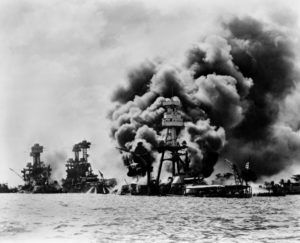
Pearl Harbor: three stricken U.S. battleships. Left to right: U.S.S. West Virginia, severely damaged; U.S.S. Tennessee, damaged; and U.S.S. Arizona, sunk, December 7, 1941. By Everett Historical @ Shutterstock.com
“The Soviet ambassador to Britain, Ivan Maisky,” writes Victor Davis Hanson in The Second World Wars, “recorded a conversation in November 1939 he had with Lord Beaverbrook, who illustrated British fears just ten weeks into the war: ‘I’m an isolationist. What concerns me is the fate of the British Empire!’”
As Hanson points out, Beaverbrook’s words were not that different from Hitler’s feelings about Britain. Hitler felt Britain should stay out of a European land war and keep its empire. Hitler felt Britain should make a deal with the Third Reich, believing both countries could keep their hegemonies.
But neutrality has its costs. “Being neutral is by design a choice,” explains Hanson, “with results that either harm or hurt the particular belligerents in question—with neutrality almost always aiding the aggressive carnivore, not its victim.”
E.J. Smith - Your Survival Guy
Latest posts by E.J. Smith - Your Survival Guy (see all)
- Your Survival Guy Breaks Down Boxes, Do You? - April 25, 2024
- Oracle’s Vision for the Future—Larry Ellison Keynote - April 25, 2024
- Investing Is Math - April 25, 2024
- Breaking: New Rules on Trillions in IRAs and 401(k)s - April 24, 2024
- When You’re in Control, You Have Opportunities - April 24, 2024















